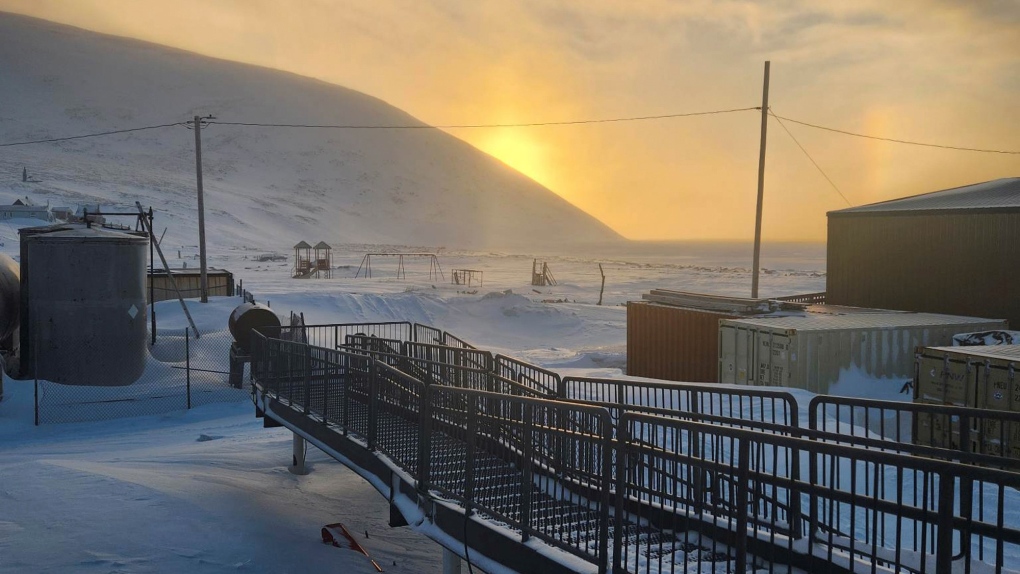
'He's in our hearts': Family and friends still seek answers one year after Nathan Wise’s disappearance
It’s been a year since Nathan Wise went missing and his family is no closer to finding out what happened to him.
A polar bear that killed a young mother and her baby last month in western Alaska was likely an older animal in poor physical condition, but tests came back negative for pathogens that affect the brain and cause aggressive behavior, officials said Monday.
Dr. Kimberlee Beckmen, a state wildlife veterinarian, collected and examined samples from the bear's head the day after the attack, when weather conditions allowed her and an Alaska State Trooper to fly to the village.
The results of her analysis, which were released Monday but initially were dated Feb. 3, indicate the bear was an adult male, probably older and in poor physical health. Officials sent a tooth to a lab to determine the bear's age, but those results won't be known for months.
Standard tests conducted on available tissues for pathogens were negative for rabies, toxoplasmosis, distemper and avian influenza.
"There is no definitive explanation as to why the bear was in poor body condition," the Alaska Department of Fish and Game and the U.S. Fish and Wildlife Service said in a joint statement.
Summer Myomick and her 1-year-old son, Clyde Ongtowasruk, were mauled to death Jan. 17 as they left the school in Wales, Alaska, for a short walk of about 150 yards (137 metres) to the town's medical clinic.
School employees attempted to stop the attack by hitting the bear with shovels, but it turned on them and chased as they went back inside for safety. The principal slammed the door to keep the bear out of the school, which was in session.
A village resident later arrived with a gun and killed the animal.
It was the first fatal polar bear attack in Alaska in three decades.
Polar bears are the largest bear species, according to the Fish and Wildlife Service. Males typically weigh 600 to 1,200 pounds (270 to 540 kilograms) but can be more than 1,700 pounds (770 kilograms) and reach up to 10 feet (3 metres) in length. Females weigh 400 to 700 pounds (180 to 320 kilograms). Polar bears generally feed on seals but also prey on walruses and beluga whales.
They were listed as threatened under the Endangered Species Act in 2008 and are also protected under the Marine Mammal Protection Act. Both laws prohibit harming the bears without authorization unless necessary for human safety.
Wales, a whaling village of about 160 people, is located about 640 miles (1,300 kilometres) northwest of Anchorage and is accessible by plane or boat.

It’s been a year since Nathan Wise went missing and his family is no closer to finding out what happened to him.
Dozens of Ontarians are expressing frustration in the province’s health-care system after their family doctors either dropped them as patients or threatened to after they sought urgent care elsewhere.
An Ottawa pizzeria is being recognized as one of the top 20 deep-dish pizzas in the world.
Amazon's paid subscription service provides free delivery for online shopping across Canada except for remote locations, the company said in an email. While customers in Iqaluit qualify for the offer, all other communities in Nunavut are excluded.
The fire burning near Fort McMurray grew from 25 hectares to 5,500 hectares over the weekend.
Russia’s President Vladimir Putin began a Cabinet shakeup on Sunday, proposing the replacement of Sergei Shoigu as defence minister as he begins his fifth term in office.
Police are searching for a male suspect after a man was “slashed in neck” on Sunday morning in downtown Toronto and died.
There were some scary moments for several people on a northern Ontario highway caught on video Thursday after a chain reaction following a truck fire.
Health Canada announced various product recalls this week, including electric adapters, armchairs, cannabis edibles and vehicle components.

English, history, entertainment, math and geography: high school trivia teams could be quizzed on any of it when they compete at the Reach for the Top Nationals in Ottawa in June.
An Ottawa pizzeria is being recognized as one of the top 20 deep-dish pizzas in the world.
A family of fifth generation farmers from Ituna, Sask. are trying to find answers after discovering several strange objects lying on their land.
A Listowel, Ont. man, drafted by the Hamilton Tigercats last week, is also getting looks from the NFL, despite only playing 27 games of football in his life.
The threat of zebra mussels has prompted the federal government to temporarily ban watercraft from a Manitoba lake popular with tourists.
A small Ajax dessert shop that recently received a glowing review from celebrity food critic Keith Lee is being forced to move after a zoning complaint was made following the social media influencer’s visit last month.
The Canada Science and Technology Museum is inviting visitors to explore their poop. A new exhibition opens at the Ottawa museum on Friday called, 'Oh Crap! Rethinking human waste.'
The Regina Police Service says it is the first in Saskatchewan and possibly Canada to implement new technology in its detention facility that will offer real-time monitoring of detainees’ vital health metrics.
Just as she had feared, a restaurant owner from eastern Quebec who visited Montreal had her SUV stolen, but says it was all thanks to the kindness of strangers on the internet — not the police — that she got it back.
 A walkway leading into the school in Wales, Alaska, where a 24-year-old woman and her 1-year-old son were killed in an encounter with a polar bear, Jan. 17, 2023. (Chrissy Friberg via AP, File)
A walkway leading into the school in Wales, Alaska, where a 24-year-old woman and her 1-year-old son were killed in an encounter with a polar bear, Jan. 17, 2023. (Chrissy Friberg via AP, File)